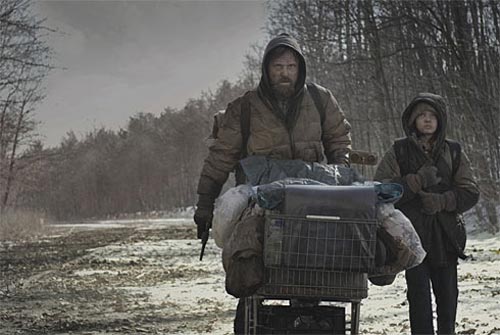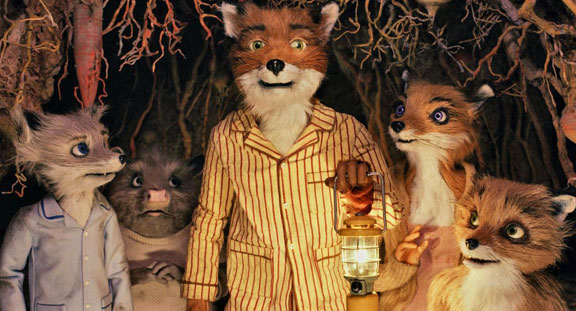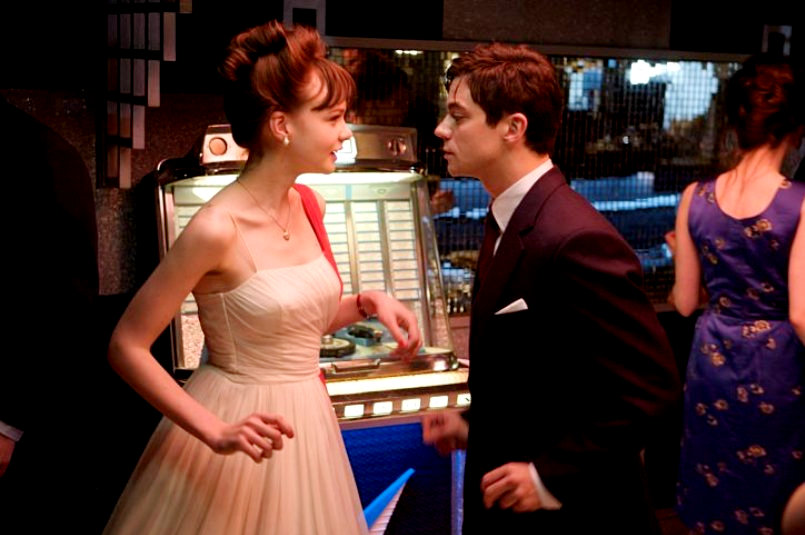

It's as if someone had taken every human moment out of 2012 - Roland Emmerich's apocalyptic disasterfest - and put them into this movie, another end-of-times story, this one penned originally by Cormac McCarthy, which focuses so intensely on how one man and child deal with a world dying by inches at the end of an apocalyptic event, that it lacks even a single CGI disaster scene.
Which isn't to say that the movie doesn't have its own cinematic moments of gray-on-gray beauty: a broken freeway spanning an abyss, a business tower in flames, a mall in destruction. What haunts these scenes are their little familiarities, carefully composed and delicately photographed, as our ordinary world is painted black: a washed out billboard, tilted telephone poles along a residential street, an ATM sign in a vandalized movie theater. But where 2012 gave us an irrepressible orgy of irrelevant specifics, The Road is a lazy, meandering journey of desperate vagueness: we're never told what caused the apocalypse and why only a few survivors remain. All we're told is that if they want to live, they need to be ever vigilant, looking out for scraps of food and wary of bands of ruthless, roving cannibals. Their main asset seems to be stupid luck. And how they got here seems to be irrelevant: whatever's caused this condition of complete despair and has put this father and son on a road of survival is merely the human condition, and our own human failing.
Which isn't to say that the movie doesn't have its own cinematic moments of gray-on-gray beauty: a broken freeway spanning an abyss, a business tower in flames, a mall in destruction. What haunts these scenes are their little familiarities, carefully composed and delicately photographed, as our ordinary world is painted black: a washed out billboard, tilted telephone poles along a residential street, an ATM sign in a vandalized movie theater. But where 2012 gave us an irrepressible orgy of irrelevant specifics, The Road is a lazy, meandering journey of desperate vagueness: we're never told what caused the apocalypse and why only a few survivors remain. All we're told is that if they want to live, they need to be ever vigilant, looking out for scraps of food and wary of bands of ruthless, roving cannibals. Their main asset seems to be stupid luck. And how they got here seems to be irrelevant: whatever's caused this condition of complete despair and has put this father and son on a road of survival is merely the human condition, and our own human failing.
This is truly a movie carried by the sets and the acting - both of which are superb, with Vitto Mortensen drawing us into the character from the first few scenes. Most of the movie is spent wandering, simply trying to survive and find food, and the man is haunted by dreams of his former life. The true inheritor of this world, however, is the son, not the man - the son who confesses to his father that it's really he that has to worry about everything. Despite the man's wariness, the son hasn't lost his basic sense of human kindness, and eventually, one realizes that even in this desolate half of a life, the son will be the one to create a new civilization.
It's only when we get to the end of the movie - which is too rushed to fully tie everything together that it's trying to - that we find out where those elements of civilization come from: from the hope of human kindness kept alive inside, even in the most dire of circumstances. The irony is that the father must extinguish his ability to trust, if he's to keep himself and his son alive, even if his son's only hope is to maintain his ability to judge human nature, and know who to trust. At the end, we realize that if only the father had been able to risk trusting someone as well, they might have both been saved.
This movie, which was slated for release last year, and then pushed back, is clearly meant to be Oscar bait. It's a dark horse, to be sure, but what it has going for it is a very Christian moral, laid out simply and starkly. I'm not convinced (the movie does too neat a job delineating between the opposing forces, when I believe the reality would be the dynamics of the shades of gray), but it sure is effective story telling. When I left the theater, even the big men in the audience weren't afraid to admit they'd been crying.









